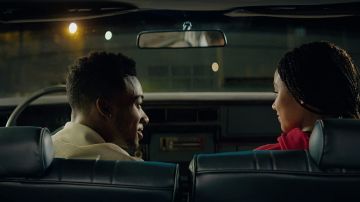The Hate U Give Should be Required Viewing for Young Women of Color in America
Within the first few minutes of the new Amandla Stenberg-starring drama The Hate U Give, you realize you’re going to be crying… a LOT

Photo: IMDB/The Hate U Give
Within the first few minutes of the new Amandla Stenberg-starring drama The Hate U Give, you realize you’re going to be crying… a LOT. But in that pain, you will also find joy, community, and love. I made a personal choice a couple of years ago to mainly consume media to projects either driven or starring people of color, particularly women of color, so when I saw that the film centered the experience of a young African American girl I was here for it. I am also a bit of an Amandla Stenberg stan — self-aware, self-possessed, and fully empowered to bring 100% of herself to every role and interview she’s taken on, Amandla is exactly the kind of role model I want my daughter to look up to.
Her tour de force performance as Starr Carter is commendable in the film, and her relationship with her father (played by actor Russell Hornsby) struck such a chord with me because I am also super close with my dad. There is a lot of violence and tragedy in this film, but the portrayal of a strong, loving, close-knit black family is so rare in media and in this movie, the family is everything and provides a welcome relief from the reality of police brutality in black communities like the one that Starr Carter is growing up in. But perhaps what was most refreshing about this film was that it sets aside the trope to the “strong black woman” and allows Starr to be exactly who she is: A brilliant and traumatized young woman caught between the desire to use her voice to better her community and the recognition that silence is the code of the streets she grew up in and will keep her life at her predominantly white private school uncomplicated.
The Hate U Give is a realistic portrait of the complexities of being a woman of color in the United States and also a meditation on generational and childhood trauma. Starr is witness to not one, but two murders before she hits 16. The first happens when she was just 10 years old and she sees her best friend Natasha gunned down by gang bangers, and the second happens in the beginning of the film as she watches her other best friend Kahlil get murdered by a cop in cold blood. Grappling with whether or not to speak out about Kahlil’s murder, her decision gets complicated by the fact that he had just fallen in with the local drug dealers and they want her to stay quiet about everything in order to keep heat off of them. As the film progresses, it becomes clear just how weighed down Starr is by everything, not just the violence in her community, but also by the code switching she has to do in order to get by in her private school, and the fact that she can never be 100% fully herself in any space she occupies except when she is with her family.
Eventually inspired by a community activist played by Issa Rae, Starr finally unburdens herself and admits to her parents that not only did she know who had murdered Natasha all along, but that she knew that the bullet was meant for her in retaliation for her father’s decision to abandon the gang he’d once been a part of. It’s a cathartic moment and a turning point for Starr. She stops suppressing her pain and starts to use it, along with her anger, to find her voice and her political power. She decides to speak out for Kahlil and against the police, and she starts to call out her friends at school for their not-so-micro aggressions and racism-lite jokes.
Even if you’re not from a community in which violence was a daily threat, or you haven’t ever had an encounter with a racist cop, there is a way in for most women of color to identify with Starr. Almost all of us have to suppress parts of ourselves in order to be accepted in predominantly white institutions, be it in our academic pursuits or in our careers. After Starr sees the cop kill her friend, she can no longer pretend to be someone she is not and she decides to bring her whole self to all aspects of her life, whether or not other people like it. It’s a lesson for all women of color, and something I hope we all get the chance to do.

















